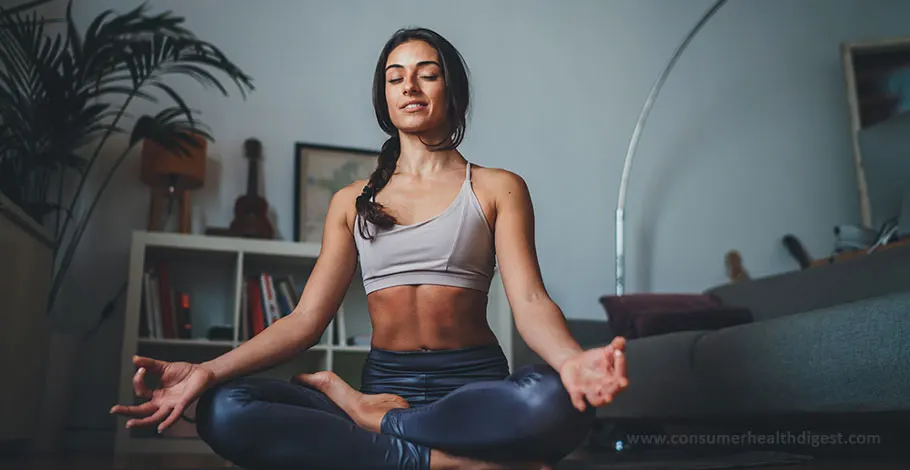Tossing, turning, and counting sheep seem like futile exercises when insomnia strikes. The relentless battle to find rest can leave you feeling drained, both physically and mentally. According to the CDC, around 70 million Americans experience chronic sleep issues, so if you’ve spent your nights staring at the ceiling with your eyes wide open instead of getting a well-deserved rest, know that you aren’t alone [1]. In this article, you’ll get to know about how small tweaks to your regular routine with home remedies can help you finally unwind your racing thoughts, relax those restless limbs and sail straight off to sleep.

We regularly assess how the content in this article aligns with current scientific literature and expert recommendations in order to provide the most up-to-date research.
Why use home remedies for insomnia?
Many individuals struggle with insomnia, which depression, stress, poor sleep habits, or medical problems can cause [2].
If you have difficulty falling and staying asleep for a prolonged time, consider consulting your doctor. They can examine you and determine whether a health issue disrupts sleep.
Generally, treatment for insomnia may include cognitive and behavioral therapy, lifestyle changes – and, in some cases, medication [3].
However, practicing good sleep hygiene is also beneficial; different home remedies for insomnia have proven to boost sleep significantly.
5 Home Remedies For Insomnia
Remedy #1: Mindfulness meditation
Mindfulness is known for its positive effects on well-being, as it can improve concentration, decrease stress, and boost immunity.
It involves taking slow, steady breaths as you sit in silence. You notice your feelings and thoughts as they come and go without engaging them.
According to Chelsey Borson, Pediatric Sleep Consultant, there is a significant relationship between sleep, stress, and depression. Poor sleep can exacerbate anxiety and depressive symptoms, creating a vicious cycle. Conversely, reducing stress through techniques like mindfulness and improving sleep hygiene can enhance sleep quality and mitigate depression.
Mindfulness meditation can improve insomnia and sleep considerably, so you may want to integrate this practice into your routine [4].
You don’t have to meditate long; aiming for 15 minutes can work wonders for your well-being.
Remedy #2: Melatonin
Melatonin is a natural hormone that regulates the body’s sleep-wake cycle. It is available as a dietary supplement in liquid or capsule, and it benefits shift workers and those experiencing jet lag or sleep disorders [5].
Make sure to consult your doctor before taking melatonin.
Remedy #3: Yoga
Practicing yoga is another way to improve your sleep quality, as it has similar effects as meditation. There are different yoga styles, so consider choosing one that focuses on breath work rather than complex physical movements [6].
Slow movements are better because they allow you to remain in the present moment. For instance, you can try yin or restorative yoga.
Ideally, you should strive for sessions of 20 minutes as a way to take care of yourself. Performing the postures before going to sleep will help you unwind and, thus, get a well-deserved rest.
However, remember only to do what feels good for your body, and don’t force a pose, as that can lead to injury.
Remedy #4: Your pillow may also be to blame for poor sleep quality.

Neck pain impacts many individuals, as people spend a lot of time on electronic devices, which is detrimental to their health.
Moreover, sitting at your desk for prolonged hours can put unnecessary strain on your body, particularly your neck, leading to significant pain when lying in bed at night.
The pain you experience can make it difficult to fall asleep, and your pillow may not give you the comfort you need to sleep tight. Perhaps you’ve tried different pillows and haven’t yet found something that works for you.
In that case, you should consider getting a cervical neck roll pillow. This pillow is filled with buckwheat hulls, providing the best firm support for your neck.
Plus, since it is easy to carry and store, you can also bring it with you when camping or traveling. Some even use it as a yoga cushion by removing the hulls.
Healthcare professionals like massage therapists and chiropractors recommend this pillow to people with neck pain.
The quality of your bedding plays a crucial role in how well you sleep, so don’t overlook this aspect. If you have a problem with your posture, neck, or spine, a buckwheat hull-filled neck roll pillow is right what you need. Check out PineTales.com to learn more about what this pillow can do for you [7].
Remedy #5: Exercise
Exercise is vital to ensure overall good health, as it can increase your energy, boost your mood, help you manage weight, and promote better sleep. To get the benefits of exercise, you should engage in physical activities for at least 20 minutes daily.
Pick a time of the day that’s right for you and positively impacts your sleep. Make sure to consider your body’s condition when choosing the type of exercise to avoid physical injury.
According to the NSF, low-impact fitness programs like swimming or walking are the best. Also, consider exercising outdoors to expose your body to natural light and establish an efficient sleep-wake cycle [8].
Other natural remedies for sleeping better
- Slow music has been found to enhance sleep, decreasing nightly awakenings and lengthening sleep time. Choose enjoyable songs and create a playlist if you want to incorporate music into your sleep hygiene [9]. Avoid pieces that bring up strong emotions, as listening to them before going to bed isn’t a great idea. Instead, choose something positive or neutral.
- Chamomile tea is used to combat anxiety, decrease muscle tension, and soothe digestion. Studies have shown this herb positively impacts insomnia, inducing sleep, so consider drinking a cup of hot chamomile tea after dinner [10]. Make sure not to drink before bedtime to avoid frequent trips to the bathroom.
- Lavender oil is derived from the lavender plant, and people have used it for years as a natural way to induce relaxation and boost sleep. Studies have shown it can improve sleep quality and duration when combined with good sleep hygiene. You can use it as a pillow spray or add it to essential oil. While lavender is generally safe, ingesting it may lead to constipation, nausea, and headache [11]. If you want to use it as a dietary supplement, it’s best to check with your doctor, as it may interact with other medications, such as those for high blood pressure.
The bottom line
While treatment for insomnia generally includes cognitive and behavioral therapy, changing your lifestyle can also help.
For instance, regular exercise works wonders in improving sleep. Similarly, you can engage in a practice like yoga or meditation.
Good sleep practices like limiting caffeine intake and avoiding blue light exposure before bedtime are also effective, so consider implementing them.
11 Sources
We review published medical research in respected scientific journals to arrive at our conclusions about a product or health topic. This ensures the highest standard of scientific accuracy.
[1] Sleep and Sleep Disorders: https://www.cdc.gov/sleep/index.html[2] Insomnia: https://www.mayoclinic.org/diseases-conditions/insomnia/symptoms-causes/syc-20355167
[3] Cognitive-Behavioral Therapy for Insomnia: An Effective and Underutilized Treatment for Insomnia: https://www.ncbi.nlm.nih.gov/pmc/articles/PMC6796223/
[4] Mindfulness meditation: A research-proven way to reduce stress: https://www.apa.org/topics/mindfulness/meditation
[5] Melatonin: What You Need To Know: https://www.nccih.nih.gov/health/melatonin-what-you-need-to-know
[6] The Benefits of Yoga: https://osteopathic.org/what-is-osteopathic-medicine/benefits-of-yoga/
[7] Good Bye Neckpain: https://www.pinetales.com/
[8]10 Tips for a Better Night’s Sleep: https://www.thensf.org/sleep-tips/
[9] Music and Sleep: https://www.sleepfoundation.org/noise-and-sleep/music
[10] Chamomile: A herbal medicine of the past with bright future: https://www.ncbi.nlm.nih.gov/pmc/articles/PMC2995283/
[11] Effect of Inhaled Lavender and Sleep Hygiene on Self-Reported Sleep Issues: A Randomized Controlled Trial: https://www.ncbi.nlm.nih.gov/pmc/articles/PMC4505755/










 This article changed my life!
This article changed my life! This article was informative.
This article was informative. I have a medical question.
I have a medical question.
 This article contains incorrect information.
This article contains incorrect information. This article doesn’t have the information I’m looking for.
This article doesn’t have the information I’m looking for.